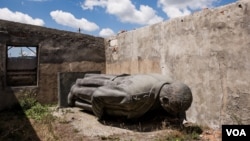Some residents of Gori, the area in the Republic of Georgia that was the birthplace of the Soviet dictator Josef Stalin, apparently still revere the former Kremlin leader.
Villagers in Ateni, just outside Gori, erected a bust of Stalin on Monday to celebrate the 71st anniversary of the Soviet Union's victory over Nazi Germany in World War II.
The bust was taken down immediately, a government statement said Tuesday, because the unauthorized display violated a long-standing ban on "the public display of symbols of totalitarianism."
Prime Minister Giorgi Kvirikashvili said his government unequivocally condemns the abuses of the Soviet regime, both in Georgia and throughout the Caucasus region, according to a statement.
Although most people in the West chiefly remember Stalin as the absolute ruler responsible for the deaths of millions of people, he still has "favorite son" status in the hearts of many Georgians. A Stalin museum — a reverent record of the personality cult that surrounded the dictator — still survives in Gori, but the government removed a large statue and monument to the Communist Party ruler in 2010.
While opinion surveys have shown that many Georgians have a positive attitude toward Stalin, Western visitors have seen no nostalgia for the former Soviet Union or a risk of a return to authoritarianism.
VOA's Georgian service contributed to this report.







